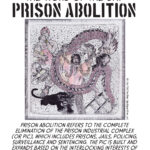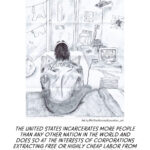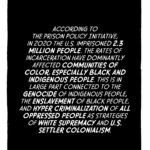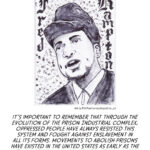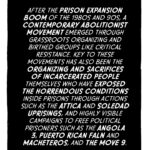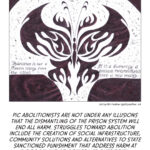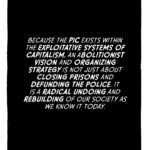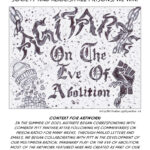Word of the Day Text by Tina Orlandini
Prison Abolition refers to the complete elimination of the Prison Industrial Complex (or PIC), which includes prisons, jails, policing, surveillance and sentencing. The PIC is built and expands based on the interlocking interests of the white supremacist imperialist U.S. government and capitalism as a whole.
The United States incarcerates more people than any other nation in the world and does so at the interests of corporations extracting free or highly cheap labor from incarcerated people. This has been described as modern-day slavery.
According to the Prison Policy Initiative, in 2020 the U.S. imprisoned 2.3 million people. The rates of incarceration have dominantly affected communities of color, especially Black and indigenous people. This is in large part connected to the genocide of indigenous people, the enslavement of Black people, and hyper-criminalization of all oppressed people as strategies of white supremacy and U.S. settler colonialism.
It’s important to remember that through the evolution of the Prison Industrial Complex, oppressed people have always resisted this system and fought against enslavement in all its forms. Movements to abolish prisons have existed in the United States as early as the 1700s or soon after the first prisons were founded in the U.S.
After the prison expansion boom of the 1980s and 90s, a contemporary abolitionist movement emerged through grassroots organizing and birthed groups like Critical Resistance. Key to these movements has also been the organizing and sacrifices of incarcerated people themselves who have exposed the horrendous conditions inside prisons through actions such as the Attica and Soledad Uprisings, and highly visible campaigns to free political prisoners such as the Angola 3, Puerto Rican FALN and Macheteros, and the MOVE 9.
PIC abolitionists are not under any illusions that the dismantling of the prison system will end all harm. Struggles toward abolition include the creation of social infrastructure, community solutions, and alternatives to state-sanctioned punishment that address harm at the root and prioritize life over death.
Because the PIC exists within the exploitative systems of capitalism, an abolitionist vision and organizing strategy is not just about closing prisons and defunding the police. It is a radical undoing and rebuilding of our society as we know it today. Because when we fight to transform our society and abolish all prisons, we win.
Datos y Dibujos - Prison Abolition by @pittpanther_art (IG )| Text by Tina Orlandini
Prison Abolition refers to the complete elimination of the Prison Industrial Complex (or PIC), which includes prisons, jails, policing, surveillance and sentencing. The PIC is built and expands based on the interlocking interests of the white supremacist imperialist U.S. government and capitalism as a whole.
The United States incarcerates more people than any other nation in the world and does so at the interests of corporations extracting free or highly cheap labor from incarcerated people. This has been described as modern-day slavery.
According to the Prison Policy Initiative, in 2020 the U.S. imprisoned 2.3 million people. The rates of incarceration have dominantly affected communities of color, especially Black and indigenous people. This is in large part connected to the genocide of indigenous people, the enslavement of Black people, and hyper-criminalization of all oppressed people as strategies of white supremacy and U.S. settler colonialism.
It’s important to remember that through the evolution of the Prison Industrial Complex, oppressed people have always resisted this system and fought against enslavement in all its forms. Movements to abolish prisons have existed in the United States as early as the 1700s or soon after the first prisons were founded in the U.S.
After the prison expansion boom of the 1980s and 90s, a contemporary abolitionist movement emerged through grassroots organizing and birthed groups like Critical Resistance. Key to these movements has also been the organizing and sacrifices of incarcerated people themselves who have exposed the horrendous conditions inside prisons through actions such as the Attica and Soledad Uprisings, and highly visible campaigns to free political prisoners such as the Angola 3, Puerto Rican FALN and Macheteros, and the MOVE 9.
PIC abolitionists are not under any illusions that the dismantling of the prison system will end all harm. Struggles toward abolition include the creation of social infrastructure, community solutions, and alternatives to state-sanctioned punishment that address harm at the root and prioritize life over death.
Because the PIC exists within the exploitative systems of capitalism, an abolitionist vision and organizing strategy is not just about closing prisons and defunding the police. It is a radical undoing and rebuilding of our society as we know it today. Because when we fight to transform our society and abolish all prisons, we win.

